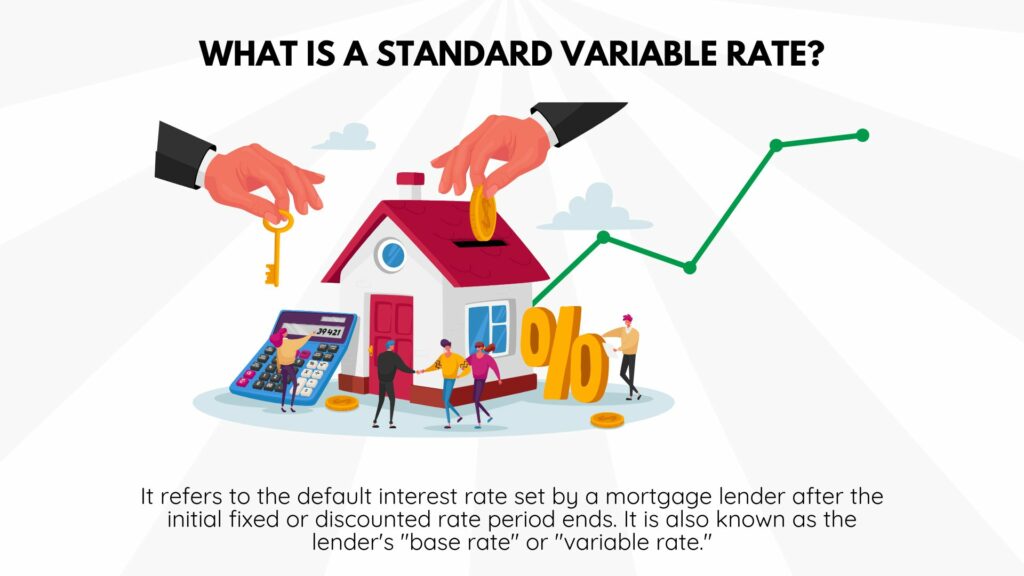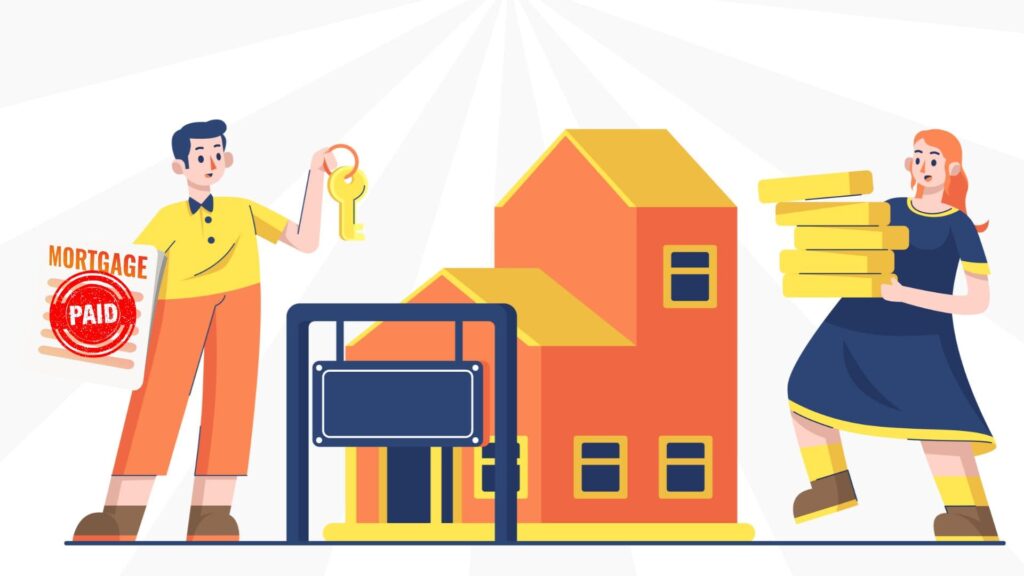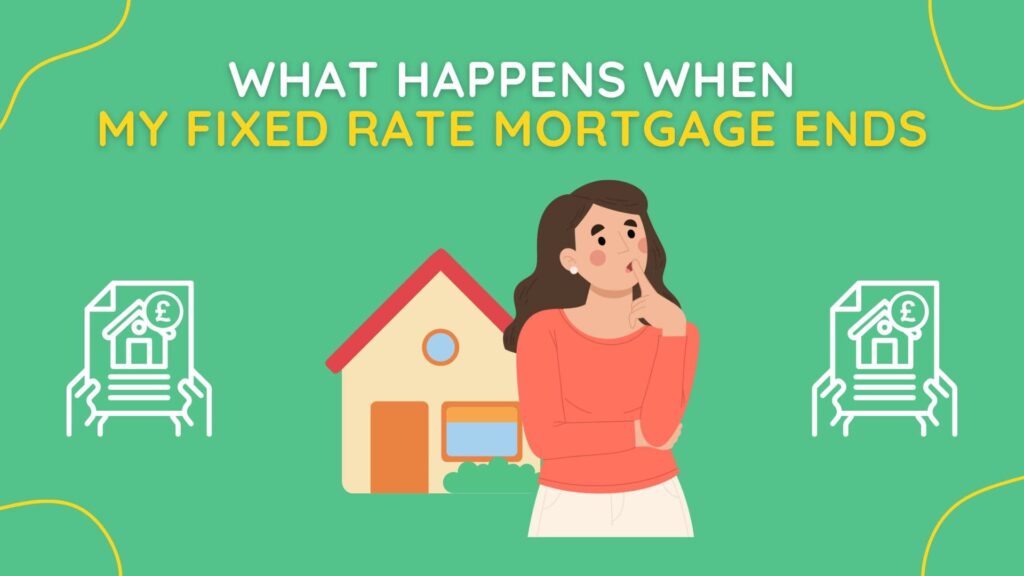
Sammie Ellard-King
I’m Sammie, a money expert and business owner passionate about helping you take control of your wallet. My mission with Up the Gains is to create a safe space to help improve your finances, cut your costs and make you feel good while doing it.
Your fixed-rate mortgage is ticking down to its final days – what’s next?
It’s a question echoing in the homes of over 1.6 million people as they near the end of their fixed term mortgage.
With interest rates currently sky-high, it’s more than just a routine query – it’s about what happens when the clock strikes zero on your mortgage deal.
We’re peeling back the layers on this financial turning point, breaking down the journey from a fixed term mortgage ending to possibly remortgaging.
Fasten your seatbelts – we’re diving into what this change means for you and your wallet
Key Takeaways:
- Plan Ahead: Don’t wait for your fixed-rate mortgage to end. Start exploring options well in advance to avoid slipping into a costlier Standard Variable Rate (SVR).
- Assess Your Financials: A changed income, credit score, or outstanding debt can hugely impact the remortgage deals available to you. Weigh these before making a decision.
- Consult a Mortgage Advisor: Given the complexity of high interest rates and fees, consulting a mortgage advisor can help you navigate the best route tailored to your circumstances.
Table of Contents
Boon Brokers are one of the UKs leading online mortgage brokers. They have a 5-star excellent Trustpilot rating with over 543 reviews.
- No mortgage fees
- Whole of market access
- Free online consultations
- Directly authorised by the FCA
- No in person meet ups
What Happens When My Fixed Rate Mortgage Ends?
To fully grasp what happens when your fixed-rate mortgage ends, it’s essential to understand the concept of a fixed-rate mortgage.
A fixed-rate mortgage is a type of home loan where the interest rate remains constant for a specific period, typically ranging from two to ten years.

This fixed rate provides stability, helping homeowners budget their monthly repayments without being affected by interest rate fluctuations in the market.
A fixed-rate mortgage can be an ideal choice when interest rates are low, as it shields borrowers from future rate increases during the agreed-upon fixed period.
However, once this period ends, the mortgage enters a new phase, and borrowers must navigate their options.
The Transition Period
When your fixed-rate mortgage ends, a transition period begins, during which you have several routes to consider.
It’s crucial to start exploring remortgaging before a fixed rate term ends to allow enough time for proper planning and decision-making.
The last thing you want to happen is your mortgage lender denies your application so get ahead of it and make sure you’re ready.
Here are some of the most common paths homeowners take after their fixed-rate mortgage deal ends:
1. Reverting to the Standard Variable Rate (SVR)
One option available to you when your fixed-rate mortgage ends is to revert to your lender’s Standard Variable Rate (SVR).

The SVR is a variable interest rate set by the lender, which can fluctuate depending on market conditions and the lender’s discretion.
It is usually higher than the initial fixed rate, which means your monthly mortgage payments may increase.
Reverting to the SVR is not always the most cost-effective option, but it provides a degree of flexibility and may be suitable for homeowners who are unsure about their future plans.
However, it’s important to be aware that SVRs can change at any time, potentially making budgeting more challenging.
2. Searching for a New Mortgage Deal with the Current Lender
Another option to consider when your fixed-rate mortgage term ends is to explore new mortgage deals offered by your current lender.
Many lenders provide their existing customers with the opportunity to switch to a new fixed-rate deal or a different type of mortgage product.
Shopping around for a new deal with your current lender can be advantageous as it may involve fewer administrative processes and potentially lower fees.
However, it’s essential to evaluate the terms and conditions of the new deal and compare it with other options available in the market. This will ensure that you secure the most favourable mortgage deal for your circumstances.
3. Remortgaging with a New Lender
Remortgaging with a new lender is another viable option when your fixed rate mortgage ends. This involves switching your mortgage to a new lender who offers a better interest rate or more favourable terms.
Remortgaging can help you save money in the long run by securing a lower interest rate or accessing additional features not available with your current lender.
Before approaching a new lender, it’s advisable to consult with a mortgage broker. A mortgage broker can help you navigate the process, find the most suitable deals, and present you with a range of options.
They have access to a broader market and can provide valuable advice tailored to your specific circumstances.
Boon Brokers are one of the UKs leading online mortgage brokers. They have a 5-star excellent Trustpilot rating with over 543 reviews.
- No mortgage fees
- Whole of market access
- Free online consultations
- Directly authorised by the FCA
- No in person meet ups
4. Paying Off Your Mortgage
For some homeowners, paying off the entire mortgage balance may be an attractive option when their fixed rate term ends.
This means using savings or other financial resources to clear the outstanding debt and become mortgage-free.
Choosing this route can provide peace of mind and financial freedom. However, it’s crucial to evaluate whether it’s financially viable and if it aligns with your long-term goals.
Paying off your mortgage completely requires careful consideration and an understanding of your overall financial situation.

When is the best time to remortgage?
The best time to remortgage is typically a few months before your current fixed-rate term ends.
This is because you’ll want to avoid the automatic transition to your lender’s Standard Variable Rate (SVR), which is generally higher and can fluctuate over time
Given the current high-interest-rate environment, the consequences of moving onto an SVR can be even more significant, leading to unexpectedly high mortgage payments. Therefore, planning ahead becomes even more crucial.
Here are some additional factors to consider:
- Market Conditions: Keep an eye on interest rate trends and forecasts. Understanding where rates might head can inform your decision on the type of mortgage you might want next.
- Personal Circumstances: If your income has changed (either increased or decreased), or you’ve come into some money, these factors could influence the type of mortgage product that would be most suitable for you.
- Financial Goals: Your long-term financial plans, whether it’s buying another property, investing, or saving for retirement, can all influence the timing and type of remortgage that would be best for you.
- Credit Score: Your current credit status can also impact when the best time to remortgage is. If your credit score has improved since you took out your original mortgage, you might qualify for better rates.
- Penalties and Fees: Look at the fine print of your current mortgage agreement to see if there are any early repayment charges and until when they apply. You’ll want to time your remortgage so that you minimise or avoid these fees.
As we are currently in a high-interest-rate market, I think it’s vital to engage in a detailed consultation with your mortgage advisor well before your current deal expires.
The remortgage process can take between 4-8 weeks, sometimes even longer depending on the lender so it’s good to get ahead of it.
What are the costs of remortgaging?
The costs of remortgaging can be varied and sometimes substantial, depending on your specific circumstances.
Here are some of the typical fees involved:
- Early Repayment Fee: This fee may apply even beyond the length of your fixed rate, depending on your mortgage terms.
- Arrangement Fee: This can be a high cost, so it’s crucial to factor this into your overall financial planning.
- Booking Fee: Generally not exceeding £200, but it’s another cost to consider.
- Valuation Fee: Though often free when remortgaging, this fee may be applicable in some circumstances.
- Conveyancing Fee: Usually free in remortgaging scenarios, but always good to double-check.
- Mortgage Broker Fee: This is applicable if you’re using a mortgage broker for the process.
It’s worth noting that the combined fees might sometimes outweigh the savings you stand to gain from a new mortgage deal.
Your mortgage advisor can guide you through the arithmetic, helping you evaluate whether remortgaging truly offers value in your specific situation.
Pros and Cons of remortgaging
Pros:
- Potential for Lower Rates: Even in a high-interest environment, different lenders may offer competitive rates.
- Access to Better Features: You may gain access to features like overpayment facilities or payment holidays.
- Capital Raising: If your home has increased in value, remortgaging can free up cash for other uses.
Cons:
- Upfront Costs: These can include legal and valuation fees, along with any early repayment charges.
- Potential for Higher Rates: Especially relevant in today’s market, you could find yourself locking into a higher rate, increasing your monthly payments.
- Credit Score Impact: Multiple hard checks on your credit report can temporarily reduce your credit score.
Is it worth getting a new mortgage deal?
Determining if it’s worth getting a new mortgage deal is a nuanced decision that depends on various factors.
While remortgaging can offer benefits like lower rates or improved terms, there are situations where you may be better off sticking with your current mortgage.
- SVR Considerations: Being on a Standard Variable Rate (SVR) mortgage won’t always be detrimental. For instance, SVRs often don’t come with early repayment charges, making it easier for you to clear your mortgage with large overpayments—perhaps from an inheritance.
- Small Outstanding Debt: If your outstanding mortgage balance is below £50,000, the fees involved in a new mortgage could nullify any financial benefits. Many lenders may also be reluctant to consider such a small mortgage.
- Changed Financial Situation: If your financial circumstances have shifted dramatically—perhaps due to job loss, new debt, or other major life changes—lenders might be hesitant to offer a remortgage.
- Affordability of New SVR: If the new SVR is still within your budget and doesn’t disrupt your financial well-being, sticking with it could be the more straightforward option, at least until your situation improves.
Given the current high interest rates, it’s tempting to think that any new deal is better than reverting to an SVR. However, it’s crucial to analyse your specific conditions thoroughly and consult with your mortgage advisor.
They can help you weigh the pros and cons tailored to your personal situation, helping you decide whether a new mortgage deal is truly beneficial.
The last resort could be switching to interest-only mortgage deals to save on costs for a while but try to avoid this situation if you can as you will still owe the principle on the loan.
Boon Brokers are one of the UKs leading online mortgage brokers. They have a 5-star excellent Trustpilot rating with over 543 reviews.
- No mortgage fees
- Whole of market access
- Free online consultations
- Directly authorised by the FCA
- No in person meet ups
FAQs
To further facilitate your understanding of what happens when your fixed-rate mortgage ends, below are some frequently asked questions and their respective answers:
Can I negotiate a new deal with my current lender when my fixed-rate mortgage ends?
Yes, you can negotiate a new mortgage deal with your current lender. It’s always worth reaching out to them and exploring the options they may offer.
However, it’s essential to compare these offers with deals available from other lenders to ensure you secure the most favourable terms.
Are there any costs involved in switching to a new mortgage deal or lender?
Yes, switching to a new mortgage deal or lender may involve certain costs.
These costs can vary and may include arrangement fees, legal fees, valuation fees, and potential early repayment charges from your current lender.
It’s crucial to factor in these costs and assess whether the potential savings outweigh the associated expenses.
Can I remortgage with a new lender if my financial circumstances have changed since I took out the initial mortgage?
Yes, remortgageing with a new lender is still a possibility, even if your financial circumstances have changed.
However, it’s important to note that lenders will conduct affordability assessments and credit checks to ensure you can handle the new mortgage repayments.
If your circumstances have significantly changed, it’s essential to seek professional advice to understand your options fully.
Should I seek the assistance of a mortgage broker when exploring my options?
Yes, consulting a mortgage broker can be highly beneficial when exploring your options.
Mortgage brokers have in-depth knowledge of the mortgage market, access to a broader range of deals, and the expertise to assess your individual circumstances.
They can provide tailored advice and help you navigate the various choices available to you.
Is it better to act early or wait until the fixed rate term ends before making a decision?
Acting early and assessing your options well before the fixed rate term ends is generally recommended.
Starting early allows you more time to research, compare deals, and secure the most favourable terms.
Leaving it too late may limit your options and lead to a hasty decision that may not align with your long-term goals.
Conclusion
When your fixed-rate mortgage term comes to an end, it’s crucial to understand the available options and carefully evaluate each one.
Whether you choose to revert to the lender’s Standard Variable Rate, negotiate a new deal with your current lender, remortgage with a new lender, or pay off your mortgage entirely, conducting thorough research and seeking professional advice will help you make an informed decision.
Remember, taking proactive steps and being well-prepared is key to securing the most favorable outcome when your fixed rate mortgage ends.
Share on social media
Disclaimer: Content on this page is for informational purposes and does not constitute financial advice. Always do your own research before making a financially related decision.



